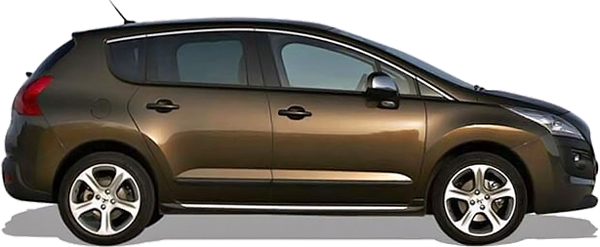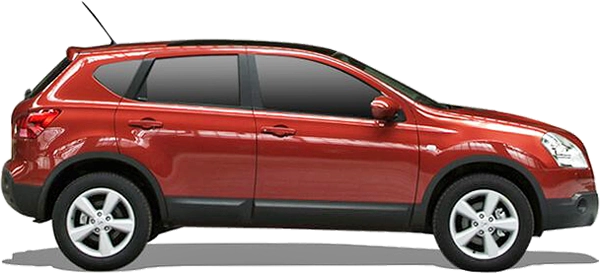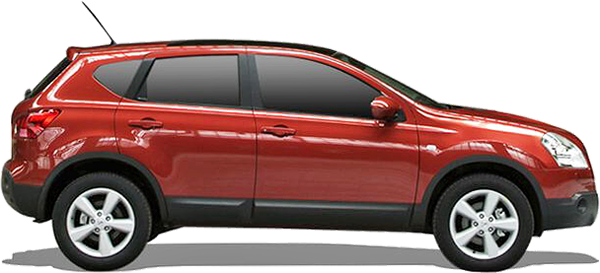The Comparative Analysis :
Peugeot 3008 e-HDi FAP 115 EGS6 (12 - 13) vs. Nissan Qashqai 2.0 4x2 CVT-Automatic (10 - 14)
€ 28,200

€ 25,600

€ 28,200
Base Price ⓘBase price of a new vehicle with standard equipment in Germany at market launch.
€ 25,600
ⓘBase price of a new vehicle with standard equipment in Germany at market launch. Price Info
Vehicle Dimensions
The Peugeot 3008 e-HDi FAP 115 STOP&START is slightly bigger in every dimension. It's 1.4 inches longer, 1.9 inches wider and 0.9 inches taller than the Nissan Qashqai 2.0.
Peugeot 3008 e-HDi FAP 115 STOP&START
Nissan Qashqai 2.0
64.5
72.3
83.2
63.6
70.5
78.3
72.3 in
Width
70.5 in
83.2 in
Width Incl. Mirrors
78.3 in
64.5 in
Height
63.6 in
102.9
171.9
103.5
170.5
171.9 in
Length
170.5 in
102.9 in
Wheelbase
103.5 in
Vehicle Weight
Peugeot 3008 e-HDi FAP 115 STOP&START
Nissan Qashqai 2.0
3505 lb
Curb Weight
3038 lb
4475 lb
Gross Vehicle
Weight
Weight
4321 lb

Weight Difference:
467 lb
13.32 %

General
Peugeot 3008 e-HDi FAP 115 STOP&START
Nissan Qashqai 2.0
0U
Generation
J10
Sport Utility Vehicle
Car Body Style
Sport Utility Vehicle
Diesel
Fuel Type
Mid-Grade Unleaded

Front-wheel drive
Drivetrain
Front-wheel drive

6-speed automated manual transmission (AMT)
Transmission
Continuously variable transmission (CVT)
Engine
Peugeot 3008 e-HDi FAP 115 STOP&START
Nissan Qashqai 2.0
Straight-four diesel engine with turbocharger
Engine Type
Straight-four gasoline engine (naturally aspirated engine)
4
Valves
4
4
Cylinders
4
1.6 L / 78 cu in
Displacement
2 L / 98 cu in
113 hp
at 3600 rpm
Power
139 hp
at 6000 rpm
Peugeot 3008 e-HDi FAP 115 STOP&START
113 hp
139 hp
Nissan Qashqai 2.0
199 lb‑ft
at 1750 rpm
Max. Torque
145 lb‑ft
at 4800 rpm
Peugeot 3008 e-HDi FAP 115 STOP&START
199 lb‑ft
145 lb‑ft
Nissan Qashqai 2.0
Performance
Peugeot 3008 e-HDi FAP 115 STOP&START
Nissan Qashqai 2.0
114 mph
Maximum Speed
114 mph
12.6 sec
Acceleration 0 to 62 mph
10.7 sec
62 mph
62
mph
mph
574 ft
0.000 sec

Peugeot 3008 e-HDi FAP 115 STOP&START
62 mph
62
mph
mph
489 ft
0.000 sec

Nissan Qashqai 2.0
▶ REPLAY
31.02 lb/hp
Weight-to-Power Ratio
21.86 lb/hp
Peugeot 3008 e-HDi FAP 115 STOP&START
31.02 lb/hp
21.86 lb/hp
Nissan Qashqai 2.0
Fuel Economy / Emissions
Peugeot 3008 e-HDi FAP 115 STOP&START
Nissan Qashqai 2.0
Fuel Economy
52 mpg
combined
31 mpg
Peugeot 3008 e-HDi FAP 115 STOP&START
52 mpg
31 mpg
Nissan Qashqai 2.0
47 mpg
city
24 mpg
56 mpg
highway
39 mpg
15.9 gal
Fuel Tank Capacity
17.2 gal
828 mi
Range
539 mi
Peugeot 3008 e-HDi FAP 115 STOP&START
828 mi
539 mi
Nissan Qashqai 2.0
Environmental Impact
92.5 kWh
Total Energy Consumption
per 100 miles ⓘThe total energy consumption per 100 miles is the amount of energy consumed by a vehicle when burning fuel or using electricity per 100 miles (final energy), and the energy required to produce the appropriate amount of fuel or electricity (primary energy).
per 100 miles ⓘThe total energy consumption per 100 miles is the amount of energy consumed by a vehicle when burning fuel or using electricity per 100 miles (final energy), and the energy required to produce the appropriate amount of fuel or electricity (primary energy).
142.1 kWh
Peugeot 3008 e-HDi FAP 115 STOP&START
92.5 kWh
142.1 kWh
Nissan Qashqai 2.0
Euro 5
Emission Standard
Euro 4 / Euro 5
188 g/mi (NEFZ)
CO2 Emissions
277 g/mi (NEFZ)
Practical Convenience
Peugeot 3008 e-HDi FAP 115 STOP&START
Nissan Qashqai 2.0
5
Doors
5
5
No. of Seats
5
970 lb
Maximum Payload
1283 lb
12.2 cu ft
Trunk Volume
11.6 cu ft









35.1 cu ft
Cargo Volume (Seats Down)
42.8 cu ft















